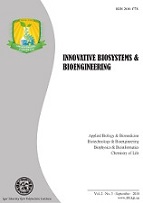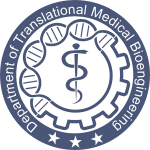Aspects of Lyophilization of Cardiac Bioimplant
DOI:
https://doi.org/10.20535/ibb.2021.5.4.239725Keywords:
scaffold, lyophilization, tissue engineering, bovine pericardium, extracellular matrixAbstract
The use of implants of biological origin in clinical practice has led to the search for methods of long-term storage of tissues without damaging their functional and structural characteristics. Xenografts (extracted from pericardium of pigs, horses, bulls) are drawing more and more interest. The bovine pericardium is exposed to chemical and physical factors providing complete purification of tissue from cells and their components. Such scaffolds are protein (collagen) complexes that fully replicate the microstructure of the pericardial tissue. Lyophilisation ensures long-term preservation of the extracellular matrix properties. The principle of the method is in drying pre-frozen tissue, in which water is sublimated. The method is intended for storage, transportation, and the subsequent use of the bioimplant in clinical practice. However, the lyophilization process may be accompanied by various undesirable factors that can lead to denaturation of the matrix protein or loss of its functionality and structure. To preserve the natural microstructure, stabilizers or various modifications (slow/fast freezing, reducing the degree of supercooling, etc.) of the lyophilization process are applied to biological prostheses. In this review, the main processes of lyophilization of biological tissue are described, which can affect the operation of a cardiac implant. A deep understanding of the parameters of the lyophilization process is crucial for creation of stable tissue grafts and their subsequent long-term storage.
References
Yancy CW, Jessup M, Bozkurt B, Butler J, Casey DE Jr, Colvin MM, et al. 2017 ACC/AHA/HFSA focused update of the 2013 ACCF/AHA guideline for the Management of Heart Failure: a report of the American College of Cardiology/American Heart Association task force on clinical practice guidelines and the Heart Failure Society of America. Circulation. 2017;136(6):e137-61. DOI: 10.1161/CIR.0000000000000509
Wilhelm MJ. Long-term outcome following heart transplantation: current perspective. J Thorac Dis. 2015;7(3):549-51. DOI: 10.3978/j.issn.2072-1439.2015.01.46
Longnus SL, Mathys V, Dornbierer M, Dick F, Carrel TP, Tevaearai HT. Heart transplantation with donation after circulatory determination of death. Nat Rev Cardiol. 2014 Jun;11(6):354-63. DOI: 10.1038/nrcardio.2014.45
Wang B, Patnaik SS, Brazile B, Butler JR, Claude A, Zhang G, et al. Establishing early functional perfusion and structure in tissue engineered cardiac constructs. Crit Rev Biomed Eng. 2015;43(5-6):455-71. DOI: 10.1615/CritRevBiomedEng.2016016066
Kaiser NJ, Coulombe KLK. Physiologically inspired cardiac scaffolds for tailored in vivo function and heart regeneration. Biomed Mater. 2015 May 13;10(3):034003. DOI: 10.1088/1748-6041/10/3/034003
Klen R. Harvesting and preserving tissues. Praha: State Publishing House of Medical Literature; 1962. 316 p.
Shangina OR, Khasanov RA, Bulgakova LA. Regularities of the structure changes of the freeze-dried connective allo-transplantats. Vestnik of the Orenburg State University. 2013;4:299-302.
Flosdorf EW. Freeze-drying: drying by sublimation. New York: Reinhold Publishing Corporation; 1949. 280 p.
Leal BBJ, Wakabayashi N, Oyama K, Kamiya H, Braghirolli DI, Pranke P. Vascular tissue engineering: polymers and methodologies for small caliber vascular grafts. Front Cardiovasc Med. 2021 Jan 11;7:592361. DOI: 10.3389/fcvm.2020.592361
Olmos-Zúñiga JR, Jasso-Victoria R, Díaz-Martínez NE, Gaxiola-Gaxiola MO, Sotres-Vega A, Heras-Romero Y, et al. Lyophilized allografts without pre-treatment with glutaraldehyde are more suitable than cryopreserved allografts for pulmonary artery reconstruction. Braz J Med Biol Res. 2016;49(2):e5001. DOI: 10.1590/1414-431X20155001
Zuki AB, Hafeez YM, Loqman MY, Noordin MM, Norimah Y. Effect of preservation methods on the performance of bovine pericardium graft in a rat model. Anat Histol Embryol. 2007;36(5):349-56. DOI: 10.1111/j.1439-0264.2007.00772.x
Offeddu GS, Ashworth JC, Cameron RE, Oyen ML. Multi-scale mechanical response of freeze-dried collagen scaffolds for tissue engineering applications. J Mech Behav Biomed Mater. 2015;42:19-25. DOI: 10.1016/j.jmbbm.2014.10.015
Saveliev VI, Kornilov NV. Actual problems of tissue transplantation. Saint Petersburg: Morsarav; 2001. 152 p.
Aimoli CG, Nogueira GM, Nascimento LS, Baceti A, Leirner AA, Maizato MJ, et al. Lyophilized bovine pericardium treated with a phenethylamine-diepoxide as an alternative to preventing calcification of cardiovascular bioprosthesis: preliminary calcification results. Artif Organs. 2007;31(4):278-83. DOI: 10.1111/j.1525-1594.2007.00376.x
Nail SL, Jiang S, Chongprasert S, Knopp SA. Fundamentals of freeze-drying. In: Nail SL, Akers MJ, editors. Devel-opment and manufacture of protein pharmaceuticals. Boston: Springer; 2002. p. 281-360. DOI: 10.1007/978-1-4615-0549-5_6
O'Brien FJ, Harley BA, Yannas IV, Gibson L. Influence of freezing rate on pore structure in freeze-dried collagen-GAG scaffolds. Biomaterials. 2004;25(6):1077-86. DOI: 10.1016/s0142-9612(03)00630-6
Pikal MJ, Shah S. The collapse temperature in freeze drying: dependence on measurement methodology and rate of water removal from the glassy phase. Int J Pharm. 1990;62(2-3):165-86. DOI: 10.1016/0378-5173(90)90231-R
Renou JP, Bonnet M, Bielicki G, Rochdi A, Gatellier P. NMR study of collagen-water interactions. Biopolymers. 1994 Dec;34(12):1615-26. DOI i: 10.1002/bip.360341206
Buttafoco L, Kolkman NG, Engbers-Buijtenhuijs P, Poot AA, Dijkstra PJ, Vermes I, et al. Electrospinning of collagen and elastin for tissue engineering applications. Biomaterials. 2006 Feb;27(5):724-34. DOI: 10.1016/j.biomaterials.2005.06.024
Faraj KA, van Kuppevelt TH, Daamen WF. Construction of collagen scaffolds that mimic the three-dimensional architecture of specific tissues. Tissue Eng. 2007 Oct;13(10):2387-94. DOI: 10.1089/ten.2006.0320
Butreddy A, Dudhipala N, Janga KY, Gaddam RP. Lyophilization of small molecule injectables: an industry perspective on formulation development, process optimization, scale-up challenges, and drug product quality attributes. AAPS PharmSciTech. 2020 Sep 3;21(7):252. DOI: 10.1208/s12249-020-01787-w
Heller MC, Carpenter JF, Randolph TW. Protein formulation and lyophilization cycle design: prevention of damage due to freeze-concentration induced phase separation. Biotechnol Bioeng. 1999 Apr 20;63(2):166-74. DOI: 10.1002/(sici)1097-0290(19990420)63:2<166::aid-bit5>3.0.co;2-h
Hottot A, Vessot S, Andrieu J. Freeze drying of pharmaceuticals in vials: influence of freezing protocol and sample configuration on ice morphology and freeze-dried cake texture. Chem Eng Process Process Intensif. 2007;46(7):666-74. DOI: 10.1016/j.cep.2006.09.003
Singh SN, Kumar S, Bondar V, Wang N, Forcino R, Colandene J, et al. Unexplored benefits of controlled ice nucleation: lyophilization of a highly concentrated monoclonal antibody solution. Int J Pharm. 2018 Dec 1;552(1-2):171-9. DOI: 10.1016/j.ijpharm.2018.09.057
Petzold G, Aguilera JM. Ice morphology: fundamentals and technological applications in foods. Food Biophys. 2009;4:378-96. DOI: 10.1007/s11483-009-9136-5
Jastrzebska M, Wrzalik R, Kocot A, Zalewska-Rejdak J, Cwalina BJ. Hydration of glutaraldehyde-fixed pericardium tissue. J Raman Spectrosc. 2003;34(6):424-31. DOI: 10.1002/jrs.1016
Tang X, Pikal MJ. Design of freeze-drying processes for pharmaceuticals: practical advice. Pharm Res. 2004 Feb;21(2):191-200. DOI: 10.1023/b:pham.0000016234.73023.75
Searles JA, Carpenter JF, Randolph TW. Annealing to optimize the primary drying rate, reduce freezing-induced drying rate heterogeneity, and determine T(g)' in pharmaceutical lyophilization. J Pharm Sci. 2001 Jul;90(7):872-87. DOI: 10.1002/jps.1040
Schwegman JJ, Hardwick LM, Akers MJ. Practical formulation and process development of freeze-dried products. Pharm Dev Technol. 2005;10(2):151-73. DOI: 10.1081/pdt-56308
Kawasaki H, Shimanouchi T, Kimura Y. Recent development of optimization of lyophilization process. J Chem. 2019;2019:9502856. DOI: 10.1155/2019/9502856
Schneid SC, Gieseler H, Kessler WJ, Luthra SA, Pikal MJ. Optimization of the secondary drying step in freeze drying using TDLAS technology. AAPS PharmSciTech. 2011 Mar;12(1):379-87. DOI: 10.1208/s12249-011-9600-7
Lim J, Kim NA, Lim DG, Kim KH, Choi D, Jeong S. Process cycle development of freeze drying for therapeutic proteins with stability evaluation. J Pharm Investig. 2016;46:519-36. DOI: 10.1007/s40005-016-0275-7
Fissore D, Pisano R, Barresi AA. Monitoring of the secondary drying in freezedrying of pharmaceuticals. J Pharm Sci. 2011 Feb;100(2):732-42. DOI: 10.1002/jps.22311
Bella J, Eaton M, Brodsky B, Berman HM. Crystal and molecular structure of a collagen-like peptide at 1.9 Е resolution. Science. 1994 Oct 7;266(5182):75-81. DOI: 10.1126/science.7695699
Wolkers WF, Oldenhof H. Principles underlying cryopreservation and freeze-drying of cells and tissues. In: Cryopreservation and Freeze-Drying Protocols. New York: Humana. p. 3-25. DOI: 10.1007/978-1-0716-0783-1_1
Polak R, Pitombo RNM. Care during freeze-drying of bovine pericardium tissue to be used as a biomaterial: a comparative study. Cryobiology. 2011 Oct;63(2):61-6. DOI: 10.1016/j.cryobiol.2011.05.001
Neuenschwander S, Hoerstrup SP. Heart valve tissue engineering. Transpl Immunol. 2004 Apr;12(3-4):359-65. DOI: 10.1016/j.trim.2003.12.010
Lopez-Moya M, Melgar-Lesmes P, Kolandaivelu K, de la Torre Hernández JM, Edelman ER, Balcells M. Optimizing glu-taraldehyde-fixed tissue heart valves with chondroitin sulfate hydrogel for endothelialization and shielding against deteriora-tion. Biomacromolecules. 2018 Apr 9;19(4):1234-44. DOI: 10.1021/acs.biomac.8b00077
Moore MA, Bohachevsky IK, Cheung DT, Boyan BD, Chen WM, Bickers RR, et al. Stabilization of pericardial tissue by dye-mediated phtooxidation. J Biomed Mater Res. 1994 May;28(5):611-8. DOI: 10.1002/jbm.820280511
Sokol AA. Biomechanical properties of scaffolds for cardiac repair and regeneration. In: Proceedings of IX International Conference Medical Physics Current State Issue Development Directions New Technologies; 2020 Sep 23-25; Kyiv. p. 14852.
Maïga A, Vera L, Marchetti C, Lorphelin A, Bellanger L, Mourier G, et al. Crystallization of recombinant green mamba с-Da1a toxin during a lyophilization procedure and its structure determination. Acta Crystallogr Sect F Struct Biol Cryst Commun. 2013 Jun;69(Pt 6):704-9. DOI: 10.1107/S1744309113011470
Horn J, Friess W. Detection of collapse and crystallization of saccharide, protein, and mannitol formulations by optical fibers in lyophilization. Front Chem. 2018 Jan 26;6:4. DOI: 10.3389/fchem.2018.00004
Cao W, Xie Y, Krishnan S, Lin H, Ricci M. Influence of process conditions on the crystallization and transition of metastable mannitol forms in protein formulations during lyophilization. Pharm Res. 2013 Jan;30(1):131-9. DOI: 10.1007/s11095-012-0855-9
Connolly BD, Le L, Patapoff TW, Cromwell MEM, Moore JMR, Lam P. Protein aggregation in frozen trehalose formulations: effects of composition, cooling rate, and storage temperature. J Pharm Sci. 2015 Dec;104(12):4170-84. DOI: 10.1002/jps.24646
Singh SK, Kolhe P, Mehta AP, Chico SC, Lary AL, Huang M. Frozen state storage instability of a monoclonal antibody: aggregation as a consequence of trehalose crystallization and protein unfolding. Pharm Res. 2011 Apr;28(4):873-85. DOI: 10.1007/s11095-010-0343-z
Pikal-Cleland KA, Rodríguez-Hornedo N, Amidon GL, Carpenter JF. Protein denaturation during freezing and thawing in phosphate buffer systems: monomeric and tetrameric beta-galactosidase. Arch Biochem Biophys. 2000 Dec 15;384(2):398-406. DOI: 10.1006/abbi.2000.2088
Van Den Berg L, Rose D. Effect of freezing on the pH and composition of sodium and potassium phosphate solutions; the reciprocal system KH2PO4-Na2-HPO4-H2O. Arch Biochem Biophys. 1959 Apr;81(2):319-29. DOI: 10.1016/0003-9861(59)90209-7
Ugwu SO, Apte SP. The Effect of Buffers on Protein Conformational Stability. Pharmaceut Technol. 2004;28:86-108.
Downloads
Published
How to Cite
Issue
Section
License
Copyright (c) 2021 The autror(s)

This work is licensed under a Creative Commons Attribution 4.0 International License.
The ownership of copyright remains with the Authors.
Authors may use their own material in other publications provided that the Journal is acknowledged as the original place of publication and National Technical University of Ukraine “Igor Sikorsky Kyiv Polytechnic Institute” as the Publisher.
Authors are reminded that it is their responsibility to comply with copyright laws. It is essential to ensure that no part of the text or illustrations have appeared or are due to appear in other publications, without prior permission from the copyright holder.
IBB articles are published under Creative Commons licence:- Authors retain copyright and grant the journal right of first publication with the work simultaneously licensed under CC BY 4.0 that allows others to share the work with an acknowledgement of the work's authorship and initial publication in this journal.
- Authors are able to enter into separate, additional contractual arrangements for the non-exclusive distribution of the journal's published version of the work (e.g., post it to an institutional repository or publish it in a book), with an acknowledgement of its initial publication in this journal.
- Authors are permitted and encouraged to post their work online (e.g., in institutional repositories or on their website) prior to and during the submission process, as it can lead to productive exchanges, as well as earlier and greater citation of published work.









